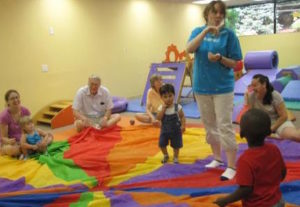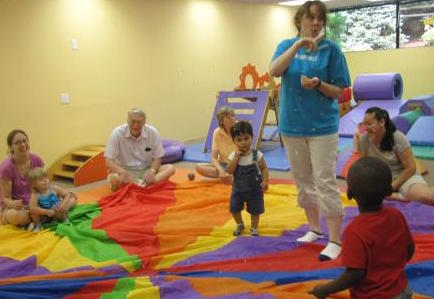
Thanks to Jillian Dent for this photo
Some of the grandparents I know live with their children and grandchildren. Others have grandchildren living in their homes, sometimes with one or both parents, others without. In fact, nearly four million American children, and 1.5 million grandparents, live in grandparent-grandchild households.
Anne Pebley of RAND Corporation and Laura Rudkin of the University of Texas have studied some of these households. They have identified the characteristics of grandchildren and grandparents in these homes, and developed a research agenda to support them. Their initial report makes interesting reading. It would be good preparation for anyone considering such an arrangement.
Many more grandparents, however, provide part time care for their grandchildren, or temporary full time care only during stressful periods. I’ve been asking some of these grandparents about their experiences, what challenges they have faced, and what have they done to keep things working smoothly.
Here are some of their suggestions:
Support your children in their marriage relationship
Whether or not you think your child and his/her mate are well suited, once they are expecting a child they need your complete support. Help them create a peaceful environment in which to nurture your new grandchild. Offer to care for their infant one evening a week or a weekend lunchtime so they can have regular time alone together. When your grandchild becomes a toddler, a preschooler, and eventually a schoolager, keep your counsel. Never take the side of one parent over another, or speak ill of a parent.
Spend as much time with your infant grandchild as you can
Try to be there when your grandchild is born. Whether or not you are actually in the room, be present in any way you can. Even if it means sitting with the family cat or dog a few miles away, or in a waiting room at the birthing center. Ask to hold your new grandchild if the circumstances are right, and visit with the new family as often as is com fortable for them during the next few weeks. You want this little person to know your scent, your voice, and your heartbeat, so when the time comes that you are responsible for her well being she will recognize you.
fortable for them during the next few weeks. You want this little person to know your scent, your voice, and your heartbeat, so when the time comes that you are responsible for her well being she will recognize you.
Be available but not pushy
Assuming that caring for your grandchild on a regular basis is something you desire, make sure that you communicate with your children that you want to be useful, and let them know your availability. If you participate in fitness or social activities on a regular basis, provide a schedule and let them know how many hours a week you can commit to the care of their child. Then wait to be asked.
Communicate Regularly with the Parents
As time goes on, your role will change. In the early weeks and months you will be holding your grandchild, rocking, pushing, lifting him into and out of strollers and car seats and cribs, but eventually you will discover it’s time to set limits and enforce them in keeping with child development milestones. Stay in close communication with your children about bedtime routines, eating habits, expectations for behavior, etc. Ask about your grandchild’s changing skill acquisitions, favorite books and toys, songs, and floor time activities. Brush up on parenting skills by taking a Grandparenting class, or by reading contemporary parenting books.
Build your own traditions
While it is important that you adhere to guidelines and routines set by your children, it is just as important to develop your own special relationship with your grandchild. Learn some new songs (or resurrect old ones), bring new books to enjoy together, play new games. You are not the parent (and it’s very important to remember that), but as a grandparent you have an enormously valuable role to play. Be a role model of honesty, creativity, and respect for others. Share stories about your childhood and the childhood of your grandchildren’s parent. You are the bridge between the generations. You are the wise elder.
Take care of yourself
Many grandparents underestimate how much energy it takes to keep up with a young child. Pay attention to your body. Get enough sleep, eat right, keep active. If you find yourself in the role of full-time caregiver, find a way to attend a fitness class that provides child care, or attend a Mommy and Me class at Gymboree or a yoga studio (chances are, there will be other grandparents there).  Plan your meals carefully so that they are easy to prepare but nutritious enough to keep you sustained. Find a way to visit with friends on a regular basis, even if it means meeting them at the park or the library during children’s story hour. As you attend organized activities for toddlers, preschoolers, and eventually schoolagers, you will meet other grandparents caring for their own grandchildren; introduce yourself, and reach out in friendship.
Plan your meals carefully so that they are easy to prepare but nutritious enough to keep you sustained. Find a way to visit with friends on a regular basis, even if it means meeting them at the park or the library during children’s story hour. As you attend organized activities for toddlers, preschoolers, and eventually schoolagers, you will meet other grandparents caring for their own grandchildren; introduce yourself, and reach out in friendship.
Suggestions from a parent
Susan Wells posted an article on a parenting blog in which she emphasized the importance in drawing “some lines between the grandparent and care taker roles.” She returned to work when her daughter was three months old, and her in-laws cared for her baby that first year and several more besides.
She was clearly grateful for their generosity – she did not pay them for their help – but suggested that setting up the arrangement in a more businesslike manner might have helped head off some of the more uncomfortable situations they had to negotiate. For example,
In retrospect, Susan believes that paying parents for caregiving levels the playing field. “They are now your employees,” she writes. At the very least, she encourages parents to pay for all expenses of caregiving, such as purchasing food and extra clothes, taking children to activities, and gas money.
It’s also important to define boundaries and discipline. “Grandma and Grandpa can’t give the kids ice cream for breakfast every day and let the kids watch TV when they are grounded.” To set a schedule and stick to it. Plan vacations well in advance. Communicate – early and often.
The grandparents I spoke with agreed with most of Susan’s suggestions. But most said they would not take money for taking care of their grandchildren – for them, caring for their grandchildren was a joy; a privilege; an honor. Everyone agreed, though, that communication is the key.
But how is that accomplished? My next set of interviews will address that question. How do parents and grandparents communicate about touchy topics – or any topics, for that matter – without ending up with hurt feelings and uncomfortable holiday dinners? How often should they talk, and how do they find the opportunity to do so without the children present? Please share your suggestions and personal experiences by replying to this post. I’d love to hear from you.
Share this post





Thanks you! I have recently started taking care of my youngest son’s daughter every Saturday and so appreciated the information. Very relevant for the times.
Penny, I’m so glad that you found my piece useful. I hope you’ll subscribe to my weekly posts and continue the conversation . . . it’s so good to hear from you after all these years.